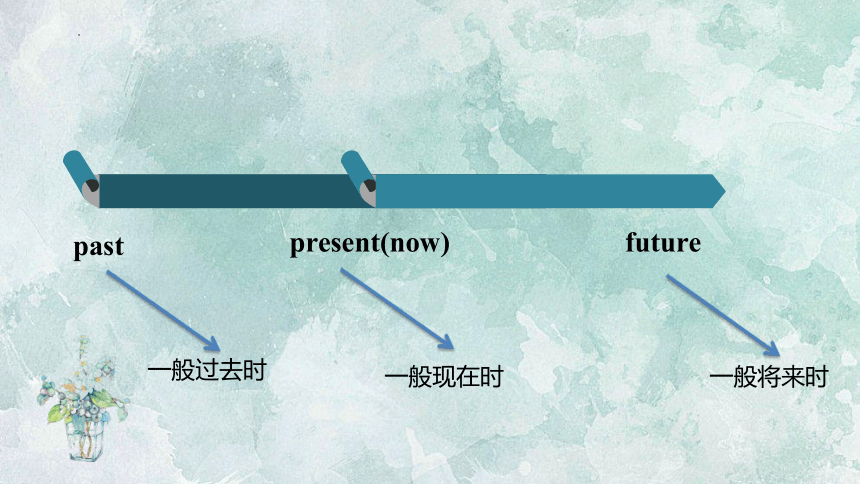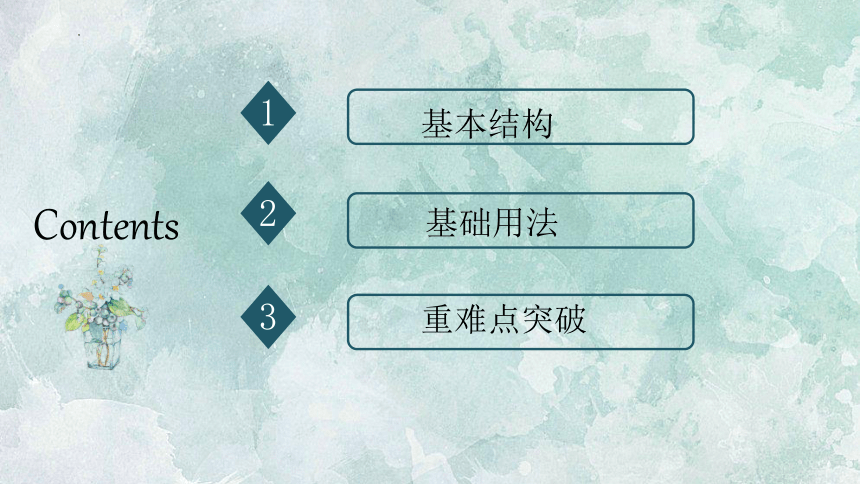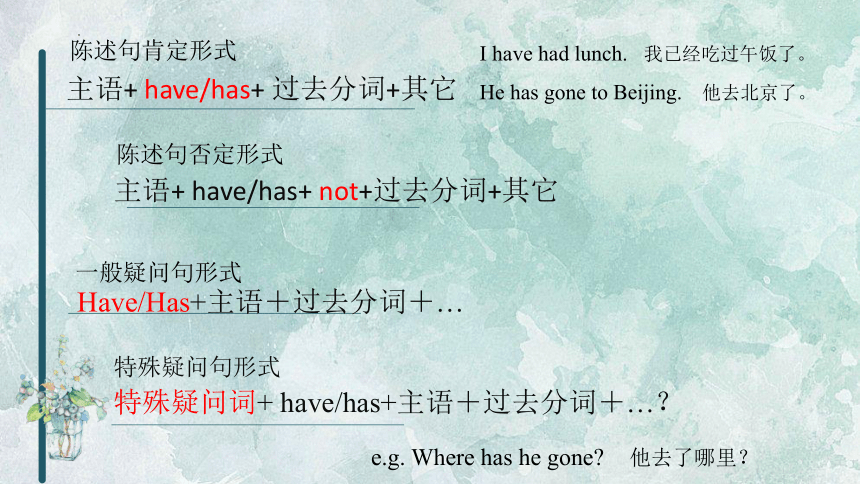-2023届高三英语二轮复习:现在完成时 课件(16张ppt)
文档属性
| 名称 | -2023届高三英语二轮复习:现在完成时 课件(16张ppt) |  | |
| 格式 | pptx | ||
| 文件大小 | 465.0KB | ||
| 资源类型 | 教案 | ||
| 版本资源 | 通用版 | ||
| 科目 | 英语 | ||
| 更新时间 | 2022-10-11 18:37:34 | ||
图片预览







文档简介
(共16张PPT)
Present perfect tence
现在完成时
past
present(now)
future
一般过去时
一般现在时
一般将来时
2
1
3
基本结构
基础用法
重难点突破
Contents
past
present(now)
现在完成时
eg.They have left.
--他们已经离开了。
I have had my lunch.
--我已经吃过午饭了。
(也就是说现在他们人不在这里)
(也就是说我现在不饿)
定义
现在完成时
eg.They have left. 他们已经离开了。
I have had my lunch. 我已经吃过午饭了。
动作或状态发生在过去,但它的影响现在还存在。
用来表示之前已经发生或完成的动作或状态,而其结果却和现在有联系:
也可表示持续到现在的动作或状态。
He has learned English since 2001.
1
现在完成时基本结构
陈述句否定形式
一般疑问句形式
陈述句肯定形式
特殊疑问句形式
主语+ have/has+ 过去分词+其它
I have had lunch. 我已经吃过午饭了。
He has gone to Beijing. 他去北京了。
主语+ have/has+ not+过去分词+其它
Have/Has+主语+过去分词+…
特殊疑问词+ have/has+主语+过去分词+…?
e.g. Where has he gone 他去了哪里?
2
现在完成时用法
完成用法
表示现在之前已发生过或完成的动作或状态,但其结果却和现在有联系,也就是说,动作或状态发生在过去但它的影响现在还存在.
现在完成时
未完成用法
指的是动作开始于过去某一时刻,一直延续到现在,或可能还要继续下去。这里的动词要用持续性动词。
与for+时间段,since+时间点(自从)连用
Mary has been ill for three days. Mary has been ill since three days ago.
He has turned off the light.
I have spent all of my money.
一、持续性动词: 表示一个动作可以持续一段时间或更长时间。
常见的be,study, play, do, read, learn, drive, write, clean , sleep, speak, talk, wait, fly, stay, sit, stand, lie, keep等;
二、瞬间性动词: 表示一个动作发生在一瞬间,非常短暂。亦称终止性动词。
常见的--begin, start, finish, go, come, leave, find, get up, arrive, reach, hear, stop, open, close, become, buy, borrow, lend等。
3
重难点突破
现在完成时往往同表示不确定的过去时间状语连用,如already(肯定), yet(否定,疑问), just, before, recently, lately等:
He has already obtained a scholarship.
Have they found the missing child yet
We have seen that film before.
现在完成时常常与表示频度的时间状语连用,如ever, never, twice, several times等:
Have you ever been to Beijing
I have used this pen only three times.
George has met that gentleman several times.
现在完成时还往往可以同包括现在时间在内的时间状语连用,如up to these few days/weeks/months/years, just, up to present(now), so far等:
Peter has written six papers so far.
Up to the present everything has been successful.
现在完成时还可以用来表示过去的一个时间到现在这段时间内重复发生的动作.
We have had four texts this semester.
He has been to the USA three times.
have been to强调“去过”,现已不在那里
She has gone to the hospital.
have gone to强调的是“去了”,现在人不在说话的现场
He has been in Shanghai for three years.
have been in一直在某地
have been to ,have gone to和have been in的区别
1. -Have you ever______Beijing to see the Great Wall -Yes, I have. A. went to B. gone to C. been in D. been to
2. My parents ______ Shangdong for ten years.
A. have been in B. have been to C. have gone to D. have been
3. Miss Green isn't in the office. she _______ to the library.
A. has gone B. went C.will go D. has been
Exercises
D
A
A
Thanks!
Present perfect tence
现在完成时
past
present(now)
future
一般过去时
一般现在时
一般将来时
2
1
3
基本结构
基础用法
重难点突破
Contents
past
present(now)
现在完成时
eg.They have left.
--他们已经离开了。
I have had my lunch.
--我已经吃过午饭了。
(也就是说现在他们人不在这里)
(也就是说我现在不饿)
定义
现在完成时
eg.They have left. 他们已经离开了。
I have had my lunch. 我已经吃过午饭了。
动作或状态发生在过去,但它的影响现在还存在。
用来表示之前已经发生或完成的动作或状态,而其结果却和现在有联系:
也可表示持续到现在的动作或状态。
He has learned English since 2001.
1
现在完成时基本结构
陈述句否定形式
一般疑问句形式
陈述句肯定形式
特殊疑问句形式
主语+ have/has+ 过去分词+其它
I have had lunch. 我已经吃过午饭了。
He has gone to Beijing. 他去北京了。
主语+ have/has+ not+过去分词+其它
Have/Has+主语+过去分词+…
特殊疑问词+ have/has+主语+过去分词+…?
e.g. Where has he gone 他去了哪里?
2
现在完成时用法
完成用法
表示现在之前已发生过或完成的动作或状态,但其结果却和现在有联系,也就是说,动作或状态发生在过去但它的影响现在还存在.
现在完成时
未完成用法
指的是动作开始于过去某一时刻,一直延续到现在,或可能还要继续下去。这里的动词要用持续性动词。
与for+时间段,since+时间点(自从)连用
Mary has been ill for three days. Mary has been ill since three days ago.
He has turned off the light.
I have spent all of my money.
一、持续性动词: 表示一个动作可以持续一段时间或更长时间。
常见的be,study, play, do, read, learn, drive, write, clean , sleep, speak, talk, wait, fly, stay, sit, stand, lie, keep等;
二、瞬间性动词: 表示一个动作发生在一瞬间,非常短暂。亦称终止性动词。
常见的--begin, start, finish, go, come, leave, find, get up, arrive, reach, hear, stop, open, close, become, buy, borrow, lend等。
3
重难点突破
现在完成时往往同表示不确定的过去时间状语连用,如already(肯定), yet(否定,疑问), just, before, recently, lately等:
He has already obtained a scholarship.
Have they found the missing child yet
We have seen that film before.
现在完成时常常与表示频度的时间状语连用,如ever, never, twice, several times等:
Have you ever been to Beijing
I have used this pen only three times.
George has met that gentleman several times.
现在完成时还往往可以同包括现在时间在内的时间状语连用,如up to these few days/weeks/months/years, just, up to present(now), so far等:
Peter has written six papers so far.
Up to the present everything has been successful.
现在完成时还可以用来表示过去的一个时间到现在这段时间内重复发生的动作.
We have had four texts this semester.
He has been to the USA three times.
have been to强调“去过”,现已不在那里
She has gone to the hospital.
have gone to强调的是“去了”,现在人不在说话的现场
He has been in Shanghai for three years.
have been in一直在某地
have been to ,have gone to和have been in的区别
1. -Have you ever______Beijing to see the Great Wall -Yes, I have. A. went to B. gone to C. been in D. been to
2. My parents ______ Shangdong for ten years.
A. have been in B. have been to C. have gone to D. have been
3. Miss Green isn't in the office. she _______ to the library.
A. has gone B. went C.will go D. has been
Exercises
D
A
A
Thanks!
